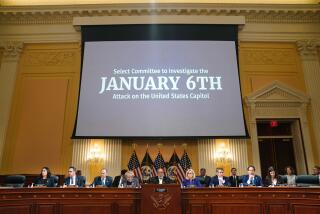Acting on the AIDS Report
- Share via
The report of the Presidential AIDS Commission is receiving the serious reception that it deserves. President Reagan has ordered a staff report within 30 days to devise “a course of action that takes us forward.” And the Republican and Democratic candidates for President in the November election have both embraced the report, including its emphasis on the need for a strong law to prohibit discrimination against people with the disease.
Discrimination is the greatest obstacle to an effective public-health response to contain the pandemic, according to the report. The fear of losing insurance, job and home would drive underground the very people who must be treated if the disease is to be contained. Efforts at legislating against discrimination have, however, been caught in partisan political maneuvering. In Washington--and in many state capitals, including Sacramento--the Republican leadership has adamantly opposed such legislation. Some within the Republic leadership have bowed to assertions by the radical right that such protections would serve only to encourage homosexuals and intravenous drug users, who in the United States have had the highest incidence of infection. This dangerously fallacious argument now will almost certainly be abandoned, given the President’s apparent openness to the implementation of the commission’s report and, even more important, given Vice President George Bush’s endorsement of the report and, specifically, its anti-discrimination recommendations.
The enthusiasm for the commission’s findings has not yet been matched by a commitment of the resources that are necessary for implementation, unfortunately. The federal budget provides substantially less than the amount calculated as essential by the commission. The recommendations include a $2.2-billion annual increase in federal, state and local funding of drug rehabilitation because of the particularly high risk that AIDS will spread to the general population from drug users.
Reagan has instructed Dr. Donald Ian MacDonald, administrator of the Alcohol, Drug Abuse and Mental Health Administration, to undertake the urgent evaluation of the commission report. It looks like a good choice. Above all, it removes the study from domestic political advisers in the White House who have resisted confronting the AIDS crisis and whose bad advice had dangerously delayed the President’s response.
Much of the credit for the new nonpartisan response is due Adm. James D. Watkins, who stepped in as commission chairman late last year when the commission appeared on the edge of collapse. He reorganized it, beefed up its staff and launched a series of public hearings that produced an extraordinarily useful and constructive report precisely on the deadline set a year earlier by the President. The report, with its 600 recommendations, deserves prompt attention. Its recommendations go far beyond the AIDS pandemic to include the fundamental weaknesses that prevail in the American health system.
Watkins summed up the AIDS Commission’s hopes, and indeed ours, in his letter transmitting the report to Reagan: “It is our hope, Mr. President, that you will use our report as your national strategy, harness the goodness that awaits your effective leadership, continue to advance the nation in conquering the virus, and lead us to take advantage of waiting opportunities for more healthy and wholesome lives.”
More to Read
Get the L.A. Times Politics newsletter
Deeply reported insights into legislation, politics and policy from Sacramento, Washington and beyond. In your inbox twice per week.
You may occasionally receive promotional content from the Los Angeles Times.










